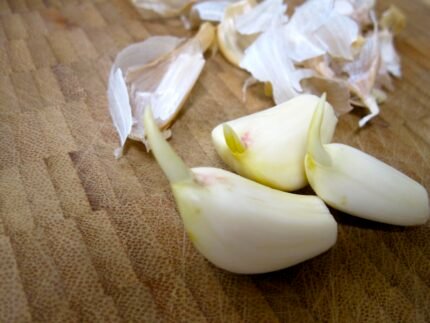Medically reviewed by Dr. Ramesh Gaddam, M.D. — Written by Sumalatha, D.N.H.E
Garlic is a popular ingredient in many dishes around the world, known for its strong flavor and numerous health benefits.
Sometimes, however, garlic starts to sprout, growing green shoots from the cloves.
This can raise questions about whether it’s safe or healthy to eat sprouted garlic.
While some people might worry that it has gone bad, sprouted garlic can still be good to eat and may even have added benefits.
In this article, we will explore what sprouted garlic is, its nutritional value, and whether you should include it in your meals.
1. Nutritional Profile of Garlic
Garlic is not only tasty but also packed with nutrients that can benefit your health.
It contains important vitamins and minerals, including:
Vitamin C:
This vitamin helps keep your immune system strong and supports healthy skin.
Vitamin B6:
This vitamin is important for brain health and helps the body use energy from food.
Manganese:
This mineral supports bone health and helps with metabolism.
Summary:
When garlic sprouts, some changes occur in its nutrient content. While it may lose some of its strong flavor, sprouted garlic can still provide health benefits.
In fact, the sprouting process may increase certain antioxidants, which can help fight free radicals in the body.
These antioxidants can protect your cells from damage and support overall health.
Whether fresh or sprouted, garlic remains a healthy addition to your diet.
Understanding its nutritional value can help you make the most of this flavorful ingredient in your meals.
2. Health Implications of Eating Sprouted Garlic
Eating sprouted garlic is generally safe and can even be good for your health.
Here are some important points to consider:
Safety of Consumption:
Sprouted garlic does not contain harmful substances, unlike some other sprouted foods.
As long as it looks fresh and has no bad signs, you can enjoy it without worry.
Nutritional Benefits:
Sprouted garlic may have more antioxidants compared to regular garlic.
Antioxidants are good for your body because they help protect your cells from damage.
This means sprouted garlic can support your overall health.
Flavor Changes:
The taste of sprouted garlic is often milder than that of fresh garlic.
While some people might prefer the stronger flavor of fresh garlic, many enjoy the subtle taste of sprouted garlic in their dishes.
Digestive Health:
Garlic, including sprouted garlic, can help with digestion. It contains fiber, which is important for a healthy digestive system.
Eating garlic may also promote good gut health.
Overall, adding sprouted garlic to your meals can provide health benefits and enhance the flavors of your dishes.
Just make sure to choose fresh sprouted garlic to get the best taste and nutrition!
3. Culinary Uses of Sprouted Garlic
Sprouted garlic can be a fun and tasty ingredient to use in your cooking.
While it may have a milder flavor than fresh garlic, it can still add a nice touch to many dishes.
Here are some ways to use sprouted garlic in your meals:
In Dishes:
You can chop or mince sprouted garlic and add it to stir-fries, soups, or sauces.
It works well in both cooked and raw dishes.
On Toast:
Try spreading some butter or olive oil on a slice of bread and topping it with chopped sprouted garlic.
You can toast it for a delicious garlic toast.
In Salads:
Slice sprouted garlic and toss it into salads for a fresh taste.
It can add a nice crunch and flavor.
With Vegetables:
Roasting or sautéing vegetables with sprouted garlic can bring out wonderful flavors.
Just mix the garlic with your favorite veggies and cook them together.
Storage Tips
To keep your garlic fresh and avoid excessive sprouting, store it in a cool, dark place.
A pantry or a basket works well.
If you notice that your garlic is starting to sprout, try to use it within a few days for the best taste and quality.
If you find that your garlic has sprouted too much or shows signs of spoilage, such as mold or a bad smell, it’s best to discard it.
Using fresh sprouted garlic can help you enjoy its flavor and health benefits in your cooking!
4. Myths and Misconceptions
There are many myths about sprouted garlic that can cause confusion.
Let’s take a look at some of these common misunderstandings and set the record straight:
Myth: Sprouted Garlic is Toxic
Some people believe that sprouted garlic is harmful to eat.
However, sprouted garlic is generally safe. It does not contain toxic substances like some other sprouted foods might.
As long as it is fresh and stored properly, you can enjoy it without worry.
Myth: Sprouted Garlic Has No Nutritional Value
Another myth is that sprouted garlic lacks health benefits.
In reality, sprouted garlic can have even more antioxidants than regular garlic, which means it can help protect your body. Eating it can still provide good nutrition.
Myth: All Sprouted Garlic Tastes Bad
Some think that once garlic sprouts, it loses its flavor.
While sprouted garlic does taste different, many people enjoy its milder taste.
It can add a unique flavor to dishes, so don’t be afraid to try it!
Myth: You Should Never Eat Garlic After It Sprouts
Finally, some believe that any sprouted garlic should be thrown away.
While it’s best to use garlic that has just begun to sprout, if it looks fresh and has no bad signs, you can still use it in your cooking.
By understanding these myths, you can feel more confident about using sprouted garlic in your meals.
It can be a tasty and healthy choice!
5. When to Avoid Eating Sprouted Garlic
While sprouted garlic can be a healthy addition to your meals, there are times when you should avoid eating it.
Here are some signs to watch for:
Signs of Spoilage:
If your garlic has mold or a bad smell, it’s best to throw it away.
Spoiled garlic can be harmful to your health, so always check for these signs before using it.
Excessive Sprouting:
If garlic has sprouted too much, it may become soft and lose its flavor.
While a small amount of sprouting is okay, garlic that is mostly green and very soft may not taste good anymore.
It’s better to use fresh garlic in these cases.
Allergies or Sensitivities:
Some people may have allergies or sensitivities to garlic.
If you notice any unusual reactions after eating sprouted garlic, such as stomach discomfort or skin irritation, it’s best to avoid it in the future.
Specific Health Conditions:
If you have certain health conditions or are taking specific medications, consult with your doctor or a nutritionist before adding sprouted garlic to your diet.
They can provide guidance on whether it’s a good choice for you.
By being aware of these signs and considerations, you can enjoy sprouted garlic safely and make sure it’s a good fit for your meals.
Always prioritize your health and well-being when choosing foods!
Conclusion
In summary, sprouted garlic can be a safe and tasty ingredient to include in your meals.
It offers many health benefits and is generally safe to eat as long as it looks fresh and doesn’t show signs of spoilage.
While it may have a milder flavor compared to fresh garlic, sprouted garlic can still add a unique touch to a variety of dishes.
It’s important to be mindful of how you store garlic to prevent excessive sprouting and to check for any signs of spoilage before using it.
By understanding the facts about sprouted garlic, you can feel confident in using it in your cooking.
So, don’t be afraid to try sprouted garlic and enjoy its flavors and health benefits in your meals!
Frequently Asked Questions (FAQs)
What Can I Do with Garlic That Has Sprouted?
You can still use sprouted garlic in your cooking. Chop it up and add it to stir-fries, soups, or salads.
The milder flavor can work well in many dishes, and it can also be roasted for a tasty side dish.
Should You Remove Sprouts from Garlic?
It is not necessary to remove the sprouts from garlic before using it.
While some people prefer to take them out for taste reasons, the sprouts are safe to eat and can add a bit of nutrition to your meal.
Does Sprouted Garlic Have Health Benefits?
Yes, sprouted garlic can have health benefits.
It often contains more antioxidants than regular garlic, which can help protect your body.
Eating sprouted garlic can support your immune system and overall health.
What If My Garlic Is Sprouting Already?
If your garlic is sprouting, don’t worry! You can still use it in your cooking.
Just check to make sure it is still fresh and not spoiled.
If it looks good, feel free to enjoy it.
Is Garlic Safe to Eat After It Has Sprouted?
Yes, garlic is safe to eat after it has sprouted, as long as it does not show any signs of spoilage.
It can be a healthy addition to your meals.
Is It Safe to Eat Green Garlic?
Yes, green garlic, which is young garlic with green shoots, is safe to eat.
It has a milder flavor and can be used in the same way as regular garlic.
How to Tell If Garlic Is Bad?
Check your garlic for signs of spoilage. If it has mold, a bad smell, or is very soft, it’s best to throw it away.
Fresh garlic should feel firm and have a pleasant scent.
How to Stop Garlic from Sprouting?
To prevent garlic from sprouting, store it in a cool, dark place.
A pantry or basket is ideal. Avoid keeping it in the fridge, as the cold can encourage sprouting.
Is Immature Garlic Safe to Eat?
Yes, immature garlic, or young garlic, is safe to eat.
It has a milder flavor and can be used in salads or cooked dishes.
Who Should Avoid Eating Raw Garlic?
People with certain health conditions, like stomach issues or allergies, should be cautious about eating raw garlic.
If you have concerns, it’s best to talk to your doctor.
Which Part of Garlic Is Not Edible?
The green sprouts of garlic are safe to eat, but if the cloves are very soft or have started to rot, those parts should be discarded.
The rest of the garlic is edible.
Is Eating Raw Garlic Anti-Aging?
Eating raw garlic may have some anti-aging benefits because of its antioxidants.
These compounds can help protect your cells from damage, supporting overall health.
What Is the 10-Minute Garlic Rule?
The 10-minute garlic rule suggests that letting chopped garlic sit for 10 minutes before cooking can boost its health benefits.
This allows the formation of beneficial compounds that may be good for your health.
What Organ Is Garlic Good For?
Garlic is good for your heart. It can help lower blood pressure and improve cholesterol levels, supporting overall heart health.
What Is the Healthiest Way to Eat Garlic?
The healthiest way to eat garlic is to consume it raw or lightly cooked. This helps preserve its nutrients and health benefits.
What Is the Best Time to Eat Garlic?
There is no specific best time to eat garlic. You can enjoy it in your meals throughout the day, depending on your preferences.
Can Too Much Garlic Damage the Liver?
Eating garlic in moderation is generally safe and healthy.
However, consuming excessive amounts may lead to digestive issues or discomfort, but it is unlikely to damage the liver.
What Happens If I Eat Garlic Every Day?
Eating garlic every day can offer health benefits, such as improved heart health and better immune support.
Just be mindful of the amount, as too much can cause digestive discomfort.
How Much Garlic Is OK Per Day?
A common recommendation is to eat 1-2 cloves of garlic per day.
This amount can provide health benefits without causing digestive issues.
Should I Chew Garlic or Swallow?
It is best to chew garlic to release its beneficial compounds.
Chewing allows the nutrients to be absorbed more effectively.
What Happens If We Eat Garlic at Night?
Eating garlic at night may help with digestion and promote better sleep.
However, some people may experience digestive discomfort, so listen to your body and adjust accordingly.
Also Read:
Is It Ok to Eat Cheese at Night? (Before Bed)
Is it OK to Eat Ramen Noodles When Sick?
Is it Healthy to Eat Fish Skin?
10 Amazing Health Benefits of Herbal Teas
Medically reviewed by Dr. Ramesh Gaddam, M.D.

General Physician, Diabetologist, and Critical Care Specialist.
Discover more from Health Build-Up
Subscribe to get the latest posts sent to your email.





